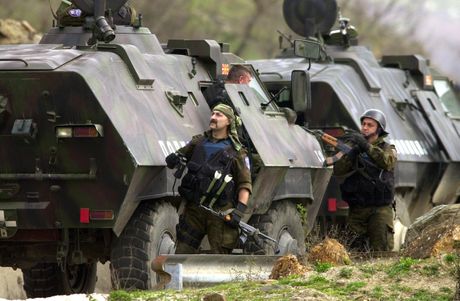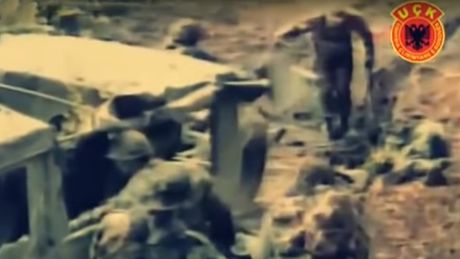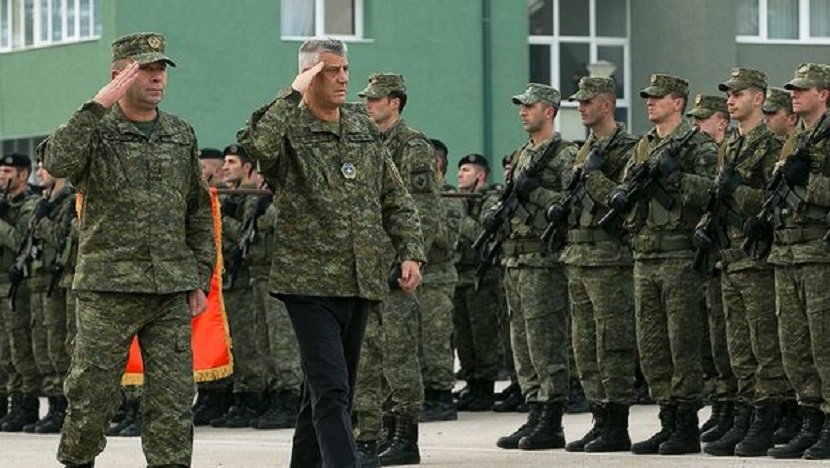22 years ago founder of so-called KLA was killed: How terrorism developed in Kosovo from Jashari
In a more than 20-year long process, from a terrorist organization, the Albanians have been able to undergo several stages of transformation and eventually reach the formation of the so-called Kosovo army, which was established two years ago, unconstitutionally

Albanians mark 22 years since the killing of the founder and one of the commanders of the so-called Kosovo Liberation Army (KLA) Adem Jashari who died during a clash with the Serbian police in the village of Prekaz.
In a more than 20-year long process, from a terrorist organization, the Albanians have been able to undergo several stages of transformation and eventually reach the formation of the so-called Kosovo army which was established on December 14, 2018, unconstitutionally. But let's go in order.
The Kosovo Liberation Army was an Albanian terrorist paramilitary organization that, through armed attacks on official state bodies and civilians of all ethnicities, fought for the independence of the Autonomous Province of Kosovo and Metohija from Serbia and from Yugoslavia, and the creation of Greater Albania. Many domestic and foreign analysts consider it a terrorist organization because of its methods of action.
It was founded in 1994 and was first became public in 1996. Its goal was an independent Kosovo, and it used all means of armed struggle.
An event that contributed to transformation of so-called KLA
In early March 1998, a clash occurred between Serbian forces and members of the so-called KLA, under the command of Jashari in Prekaz, where his group was based. The attack began on March 5 after a group of Albanian terrorists attacked a police patrol in the village of Lausa and wounded two police officers. Immediately, the police started looking for them.
The Serbian police forces created an impenetrable ring around the village, after which Jashari was asked to surrender, which he refused. In the three-day attack, besides Jashari, several members of his family were killed, as well as women and children whom he did not want to release, despite the urging from the Serbian forces, using them instead as live shield in the hope of gaining time until he received reinforcements.

Pristina has declared Adem Jashari a national hero equal to Skanderbeg. He has monuments in Pristina, Tirana and Skopje.
Formation of Kosovo Protection Corps
After Jashari's death and the destruction of his group, Hashim Thaci occupied the most significant place in the KLA, remaining at its helm until its dissolution. An agreement on its transformation was signed in Pristina on September 20, 1999.
By demilitarizing members of this terrorist organization, the so-called Kosovo Liberation Army was reintegrated into the Kosovo Protection Corps (KPC).
In January 2000, a United Nations decree launched a program to train KLA members for admission into the new formation, by which the KLA effectively continued to exist.

The first commander of the corps was Agim Ceku, who was later succeeded by Sulejman Selimi, who is currently in prison for crimes committed during the war.
From KPC to Kosovo Security Force
Following Kosovo's unilateral declaration of independence on February 17, 2008, a year later, on January 21, 2009, the Kosovo Security Forces (KSF) was established from the Kosovo Protection Corps.
KSFs become the official armed forces in Kosovo and Metohija under the control and command of KFOR and the self-proclaimed republic of Kosovo.
Formation of "Kosovo Army"
Finally, by adopting a set of laws in the Pristina parliament, the KSF was transformed into a Kosovo army on December 14, 2018, outside of the Kosovo constitution's provisions.
NATO Secretary General Jens Stoltenberg said at the time that he regretted the decision of the Kosovo parliament because it was "the wrong time for that step."
This view was shared by the European Union. EU Commission spokeswoman Maja Kocijancic said at the time that "like NATO, the EU continues share the view that the mandate of the KSF can only be changed through an inclusive and gradual process in accordance with the Kosovo constitution."
"For Belgrade, the Kosovo army is an illegal occupation formation in the territory of Serbia, formed with the aim of forcibly changing the country's borders," Marko Djuric, director of the Government Office for Kosovo and Metohija, said at the time presenting the position of Belgrade.
Some leaders of the paramilitary formation today hold high office
Former prime minister of the self-proclaimed Kosovo Ramush Haradinaj was among the former leaders of the terrorist KLA against whom the Hague Tribunal raised two indictments for war crimes. Due to lack of evidence, he was acquitted on both occasions and resigned as prime minister in July 2019, when he again received a summons from the new, special court. He has been interviewed but no indictment has been raised yet.
Haradinaj completed his training in 1996 in Albania and participated in the creation of terrorist bases in northern Albanian towns of Tropoj and Kukes. He entered Kosovo and Metohija illegally and returned permanently in mid-1997, when he and his brothers Daut and Skelzen organized terrorist attacks against the police across Metohija. In April 1998, he became one of KLA's regional commanders.
At his initiative, a special unit, "Black Eagles," was formed in Glodjane as part of the KLA, responsible for carrying out torture and killings of dozens of Serb civilians, whose bodies were found in Lake Radonjic and in a number of village wells in the Decani municipality. He is accused of mass murder of Serbs in the Glodjane area, where more than 20 corpses were found on an agricultural plantation in the summer of 1998.
On July 11, 1997, the current president of self-proclaimed Kosovo, Hashim Thaci, was found guilty in absentia and sentenced to 10 years for forming a hostile terrorist association as part of the KLA. A Belgrade court found that Thaci was among the organizers of the 1993 attack on facilities, vehicles and members of the police, army and refugee camps in the Glogovac area, during which four police officers were killed and three wounded, while there had been attempts to kill 16 others.
An international arrest warrant for Thaci was secretly canceled, without any disclosure as to why and on whose request.

Former Minister of the Kosovo Security Force Rustem Berisha organized and operated prisons in the territory of Orahovac and Prizren. He participated in the attack on the Yugoslav Army at the Kosare border outpost, and according to witnesses, in 1999 he personally executed several Serbian soldiers, for which the Higher Court in Nis found him guilty on charges of terrorism, specifically, for the murder of Serbian soldiers at Kosare in 1998.
Video: Haradinajs address after he was questioned in The Hague
Following the formation of a new government in Pristina, Berisha was elected as the new minister of defense.
Special court formed, but no indictment yet
The Special Court for war crimes cases committed by former members of the so-called KLA is yet to raise any indictments, while the media recently cited sources close to the court to report that this would happen by the fall of this year.
Video: Terrorists, NATO, Foreign Legion all charged at Kosare, but failed to enter Metohija
(Telegraf.rs)
Telegraf.rs zadržava sva prava nad sadržajem. Za preuzimanje sadržaja pogledajte uputstva na stranici Uslovi korišćenja.




